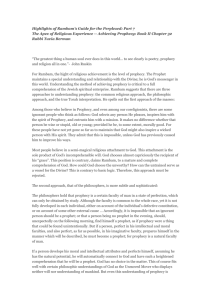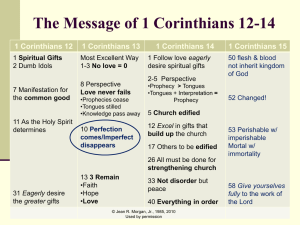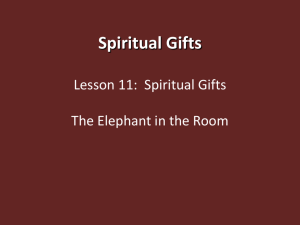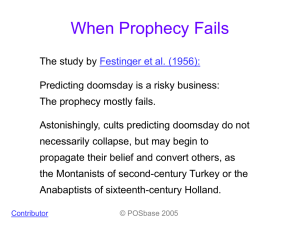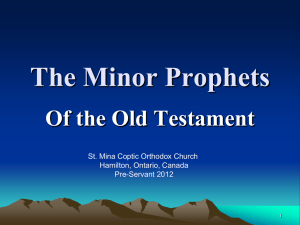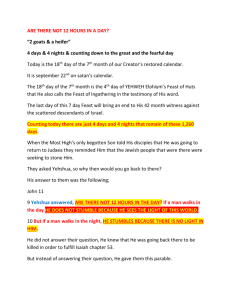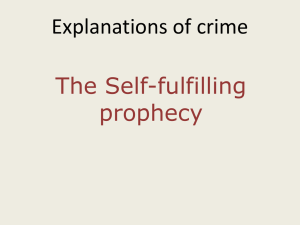Christianity Today - Bible Study Downloads
advertisement
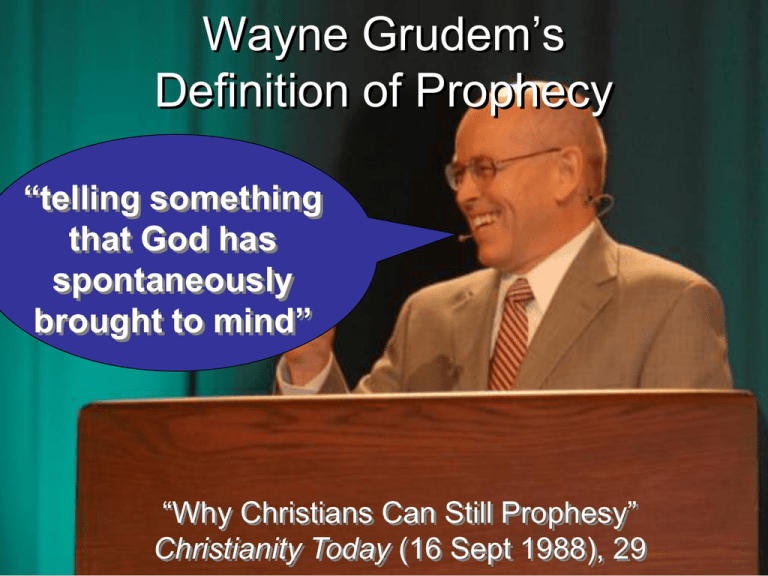
Wayne Grudem’s Definition of Prophecy “telling something that God has spontaneously brought to mind” “Why Christians Can Still Prophesy” Christianity Today (16 Sept 1988), 29 Summary of Prophetic Views 26 Grudem’s View Biblical View Prophecy is declaring anything (true or false) that the Spirit brings to one’s mind The above definition was invented in 1988 by Wayne Grudem Prophecy is declaring God’s inspired and inerrant revelation to others The above definition has been the teaching of the church for 20 centuries OT prophets are parallel to NT apostles OT prophets are parallel to NT prophets God changed the definition of prophecy from the OT to the NT God kept the meaning of prophecy consistent between the two testaments God gives all prophecies without errors (2 Pet. 1:20-21) Only those with the gift of prophecy can prophesy (1 Cor. 12:29) There’s one kind of NT prophecy (infallible) Fallible prophecy is false prophecy (Deut. 13:1-5; 18:14-20) God always tells the truth since He cannot lie (Heb. 6:18) God gives some prophecies with errors Any believer can prophesy There’s two kinds of NT prophecy (fallible and infallible) Fallible prophecy can be inspired God sometimes lies Tongues verses Prophecy 34 Tongues Prophecy Value Inferior (14:5a) Superior (14:1) Relation to Other Gifts The least important gift (12:28) The second most important gift (12:28) Language Used Foreign (14:10) Vernacular (14:19) Corollary Gift Interpretation of tongues (12:30; 14:27-28) Discerning of spirits (12:10; 14:29) Speaker’s Knowledge of Language Unknown: “utters mysteries with his spirit…my spirit prays but my mind is unfruitful” (14:2b, 14) Value (without Interpretation) Harmful: people cannot understand and thus are not edified (14:16-17, 23, 28) Known: “pray with my spirit [and] with my mind” (14:15, 19) Great: people can understand and thus are edified (14:5b, 24-25) Edification (without Interpretation) Self only (14:4a; cf. 10:24; 12:7, 11) Entire church (14:4b) 34 Tongues verses Prophecy Direction of Speech is to… Result in Others Type of Communication Purpose Limitations Tongues Prophecy God (14:2) Men (14:3) Revelation, knowledge, prophecy, word of instruction (14:6) Speaking (14:6), prayer (14:14), praise (14:16), singing? (14:15b) Sign to unbelieving Jews (14:21-22a) Strengthening, encouragement, and comfort (14:3b) Foretelling the future, “forthtelling” or declaring doctrinal truth (14:19) Message to believers (14:22b) Two or three tongues messages in Two or three prophetic messages each service (14:27a), speak in in each service (14:29a), speak in turn (14:27b), someone must turn (14:30-31), weigh what is said interpret (14:27c-28) (14:29b, 32) Exhortation Negative: Do not forbid tongues (14:39b) Positive: Be eager to prophesy (14:39a) Agent of Cessation Self: middle voice (13:8b) Someone other than self: passive voice (13:8a) Prophecy versus Teaching Teaching Value 27 Prophecy Inferior: Teaching is listed after Superior: Prophecy has a long OT prophecy in the leadership history of declaring an uninterpreted structure of the church at word of God (2 Pet. 1:20-21) Antioch (Acts 13:1) whereas teachers must interpret it Relation to the Other Gift A less important gift: listed after prophecy in the priority of the gifts (1 Cor. 12:28) The second most important gift, superseded only by apostleship (1 Cor. 12:28) Authority Less authoritative than prophecy as the teacher must interpret God’s written Word More authoritative than teaching since the spoken word is inspired and uninterpreted (2 Pet. 1:20-21) Source of Truth is… God’s Word (Col. 3:16) God’s Spirit (2 Pet. 1:21) Revelatory Nature Uninspired explanation of already revealed truth (Acts 15:35; 11:12, 26; Rom. 2:21; 15:4; Heb. 5:12) Inspired foretelling the future or “forth-telling” (declaring doctrinal truth) received by revelation (1 Cor. 14:19, 26, 29-30; Eph. 3:5) Prophecy versus Teaching 27 Teaching Prophecy Style Systematic Spontaneous (Acts 11:28; 21:4, 10-11) Limitations No limitation on teaching is given in church services 2-3 prophetic messages per service (14:29a), speak in turn (14:30-31), weigh what is said (14:29b, 32) Leadership Requirements Required of elders (1 Tim. 3:2; 5:17; Tit. 1:9) since the church needs continued teaching of truth through its history Not required of elders as this would provide too high a standard; also, revelation need not continue after the canon is complete (Rev. 22:18-19) Not foundational for the Church— Foundational for the Church along with the foundation is not in interpreted apostleship (Eph. 2:20), which means Foundation for the messages but in divinely spoken that it need not continue through Church Church and written messages from God by history since the foundation is provided apostles and prophets once-for-all (e.g., no apostles today) Cessation No hint is given in the NT that this The gift will cease by someone other gift has ceased or will do so in the than self: passive voice (1 Cor. 13:8a; cf. church age Spiritual Gifts notes, 29) Distinguishing of Spirits “The spiritual capacity to determine whether a teacher, prophet, or preacher is speaking under the impulse of the Holy Spirit, his own spirit, or evil spirits” --Bill McRae, The Dynamics of Spiritual Gifts, 73


